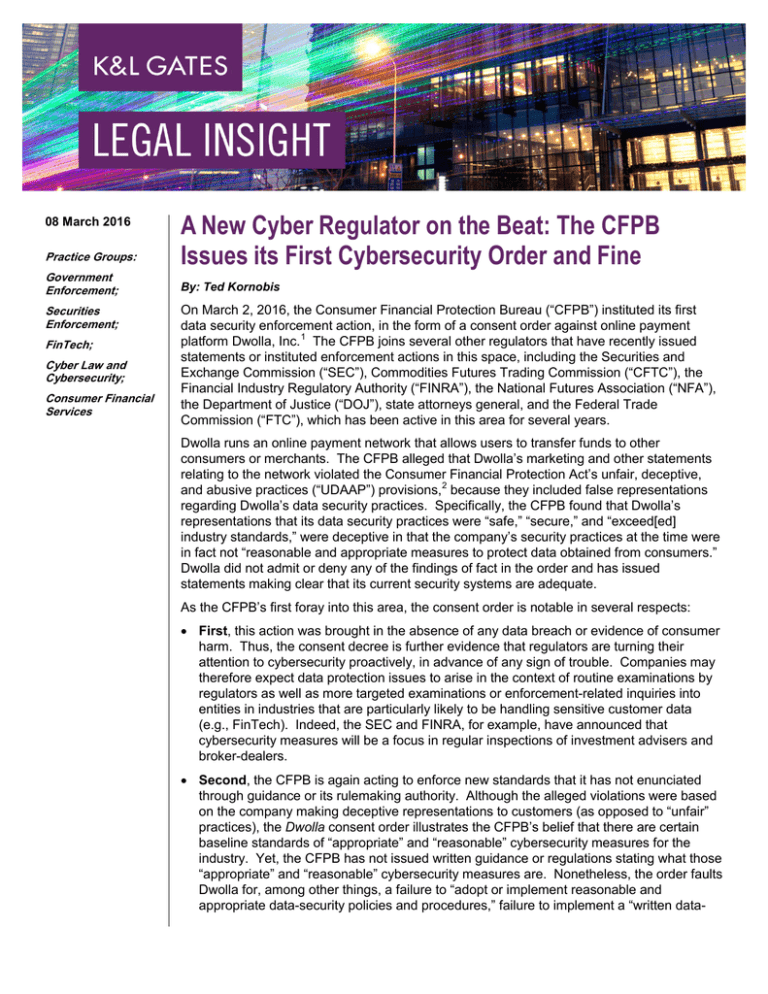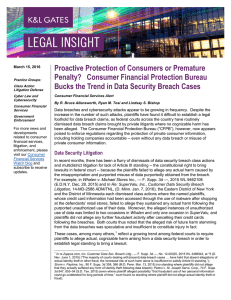
08 March 2016
Practice Groups:
Government
Enforcement;
Securities
Enforcement;
FinTech;
Cyber Law and
Cybersecurity;
Consumer Financial
Services
A New Cyber Regulator on the Beat: The CFPB
Issues its First Cybersecurity Order and Fine
By: Ted Kornobis
On March 2, 2016, the Consumer Financial Protection Bureau (“CFPB”) instituted its first
data security enforcement action, in the form of a consent order against online payment
platform Dwolla, Inc. 1 The CFPB joins several other regulators that have recently issued
statements or instituted enforcement actions in this space, including the Securities and
Exchange Commission (“SEC”), Commodities Futures Trading Commission (“CFTC”), the
Financial Industry Regulatory Authority (“FINRA”), the National Futures Association (“NFA”),
the Department of Justice (“DOJ”), state attorneys general, and the Federal Trade
Commission (“FTC”), which has been active in this area for several years.
Dwolla runs an online payment network that allows users to transfer funds to other
consumers or merchants. The CFPB alleged that Dwolla’s marketing and other statements
relating to the network violated the Consumer Financial Protection Act’s unfair, deceptive,
and abusive practices (“UDAAP”) provisions,2 because they included false representations
regarding Dwolla’s data security practices. Specifically, the CFPB found that Dwolla’s
representations that its data security practices were “safe,” “secure,” and “exceed[ed]
industry standards,” were deceptive in that the company’s security practices at the time were
in fact not “reasonable and appropriate measures to protect data obtained from consumers.”
Dwolla did not admit or deny any of the findings of fact in the order and has issued
statements making clear that its current security systems are adequate.
As the CFPB’s first foray into this area, the consent order is notable in several respects:
• First, this action was brought in the absence of any data breach or evidence of consumer
harm. Thus, the consent decree is further evidence that regulators are turning their
attention to cybersecurity proactively, in advance of any sign of trouble. Companies may
therefore expect data protection issues to arise in the context of routine examinations by
regulators as well as more targeted examinations or enforcement-related inquiries into
entities in industries that are particularly likely to be handling sensitive customer data
(e.g., FinTech). Indeed, the SEC and FINRA, for example, have announced that
cybersecurity measures will be a focus in regular inspections of investment advisers and
broker-dealers.
• Second, the CFPB is again acting to enforce new standards that it has not enunciated
through guidance or its rulemaking authority. Although the alleged violations were based
on the company making deceptive representations to customers (as opposed to “unfair”
practices), the Dwolla consent order illustrates the CFPB’s belief that there are certain
baseline standards of “appropriate” and “reasonable” cybersecurity measures for the
industry. Yet, the CFPB has not issued written guidance or regulations stating what those
“appropriate” and “reasonable” cybersecurity measures are. Nonetheless, the order faults
Dwolla for, among other things, a failure to “adopt or implement reasonable and
appropriate data-security policies and procedures,” failure to implement a “written data-
A New Cyber Regulator on the Beat: The CFPB Issues its First Cybersecurity
Order and Fine
security plan,” failing to conduct “adequate, regular risk assessments,” and not providing
“adequate training and guidance” to employees.
That a regulator is setting standards through enforcement activity is not new. In its
enforcement action against Wyndham Worldwide Corporation, 3 the FTC pursued unfair
and deceptive acts and practices (“UDAP”) claims based on Wyndham’s representations
about its cybersecurity efforts. The FTC alleged that those representations were both
“deceptive,” in that they were inaccurate, and were “unfair,” in that the company’s actual
cybersecurity practices were purportedly deficient. On appeal to the Third Circuit,
Wyndham argued that it lacked fair notice as to the standard to which the FTC was
holding it, asserting that there were no rules or statutes explaining what steps companies
must take to safeguard customer data. The Third Circuit rejected Wyndham’s arguments,
holding that the company had sufficient notice that its activity could fall within the ambit of
the Federal Trade Commission Act’s UDAP statute,4 which is similar to the Consumer
Financial Protection Act’s UDAAP provisions, although the court did not decide whether
the conduct at issue actually constituted “unfair” acts or practices.5 The court noted that
agency guidance documents, enforcement actions, and settlements could provide
adequate notice as to what cybersecurity measures are reasonable.
In the Dwolla consent order, the CFPB did not cite specific regulations, past consent
decrees, or government-issued guidance as sources forming the basis for what it claims
to be “reasonable and appropriate” measures, but it did cite to “industry standards”
requiring encryption and standards issued by the Payment Card Industry (PCI) Security
Standards Council. However, in significant part, the Dwolla consent order appears to
build on the foundation laid in the Wyndham decision as another example of a regulator
measuring companies’ cybersecurity efforts based on an imprecisely articulated standard
with respect to what is “adequate” and “reasonable.”
• Third, the Dwolla consent order does provide a window into what types of measures the
CFPB will be looking at in future cases. Among other things, the CFPB found that Dwolla
was lacking: (1) a written data security plan, (2) employee training on data security, (3)
regular risk assessments, (4) appropriate vetting of vendors who handle customer data to
ensure they have sufficient data protection standards and policies, and (5) encryption of
any sensitive data. 6
Companies of all types, including those in emerging technology and FinTech, should be
aware that federal regulators are looking at data security practices—even in the absence of
an actual breach—and may use their enforcement powers to remedy cybersecurity
measures that do not meet the regulators’ view of “reasonable” or “adequate.”
Author:
Ted Kornobis
ted.kornobis@klgates.com
+1.202.778.9180
2
A New Cyber Regulator on the Beat: The CFPB Issues its First Cybersecurity
Order and Fine
Additional Contacts:
Irene C. Freidel
irene.freidel@klgates.com
+1.617.951.9154
Stephen G. Topetzes
stephen.topetzes@klgates.com
+1.202.778.9328
Anchorage
Austin
Fort Worth
Frankfurt
Orange County
Beijing
Berlin
Harrisburg
Palo Alto
Paris
Boston
Hong Kong
Perth
Brisbane
Houston
Pittsburgh
Brussels
London
Portland
Charleston
Los Angeles
Raleigh
Charlotte
Melbourne
Research Triangle Park
Chicago
Miami
Dallas
Milan
San Francisco
Doha
Newark
Dubai
New York
São Paulo
Seattle
Seoul Shanghai Singapore Sydney Taipei Tokyo Warsaw Washington, D.C. Wilmington
K&L Gates comprises approximately 2,000 lawyers globally who practice in fully integrated offices located on five
continents. The firm represents leading multinational corporations, growth and middle-market companies, capital
markets participants and entrepreneurs in every major industry group as well as public sector entities, educational
institutions, philanthropic organizations and individuals. For more information about K&L Gates or its locations,
practices and registrations, visit www.klgates.com.
This publication is for informational purposes and does not contain or convey legal advice. The information herein should not be used or relied upon in
regard to any particular facts or circumstances without first consulting a lawyer.
© 2016 K&L Gates LLP. All Rights Reserved.
1
Consent Order, In re Dwolla, Inc., File No. 2016-CFPB-0007 (Mar. 2, 2016).
12 U.S.C. § 5531(a).
See Am. Compl., FTC v. Wyndham Worldwide Corp., No. 12-1365 (D. Ariz. Aug. 9, 2012).
4
15 U.S.C. § 45(a) (making unlawful “unfair or deceptive acts or practices in or affecting commerce”).
5
See FTC v. Wyndham Worldwide Corp., 799 F.3d 236 (3d Cir. 2015).
6
Some of these allegations as to insufficient data security measures are similar to those described in other regulator cybersecurity actions.
See, e.g., Complaint at ¶ 21, In re Credit Karma, Inc., Dkt. No. C-4480 (FTC Aug. 13, 2014).
2
3
3



